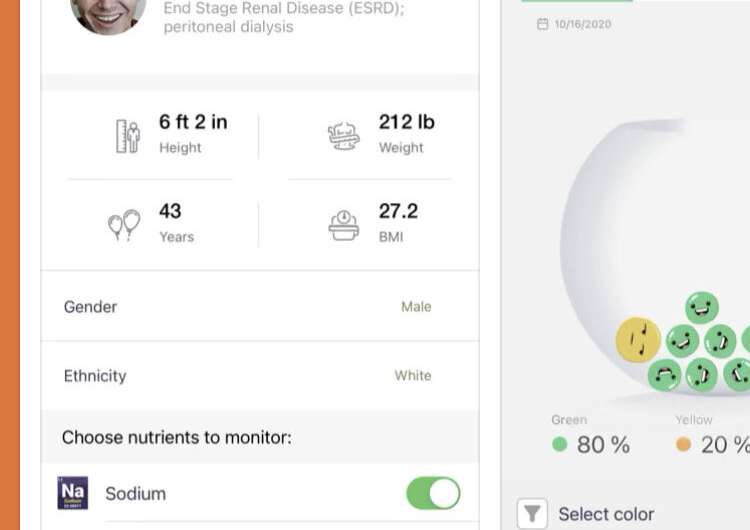Health researcher designs app to help heart, kidney disease patients manage diet

The best way to manage conditions like kidney and heart disease is to manage one's diet in accordance with medical recommendations to limit the intake of certain nutrients. However, many patients struggle to comply with these recommendations without a simple way to track their nutrition throughout the day.
To answer this challenge, Dr. Ibrahim Elali, a nephrologist and assistant professor in the UConn School of Medicine, has developed DecideDiet.
DecideDiet is a smartphone app aimed at alleviating the burden of monitoring these diseases.
"It's not about the healthy population," Elali says, "it's about targeting people living with chronic diseases."
DecideDiet is a free app that allows patients to simply scan a barcode or manually enter the food they are going to eat. The app will automatically evaluate the sodium and potassium content of the item and rate it either green, yellow, or red.
Users should try to eat at least 75% of their foods in the green and avoid foods in the red. This system will help users not only day-to-day, but over time by learning to avoid foods with high sodium and potassium.
"We can't reprogram our taste buds in five minutes," Elali says. "It actually takes on average 6 months to get used to a low salt diet."
The "basket" on the app will keep track of all the food entered over the course of a day, month and three-month period.
DecideDiet can potentially facilitate conversations between patients and their health care providers about their diet when they have all their nutrition data in hand and the ability to easily share data between devices.
This app fills a niche in the market as most nutrition apps are focused on counting calories and weight loss. Even the few other existing apps for disease monitoring lack DecideDiet's simplicity and many of its features.
Elali saw a need for an app like DecideDiet from his interactions with his own patients.
"I saw a need for something better than a paper to give to my patients," Elali says.
Normally, doctors can only provide patients with a pamphlet about dietary recommendations and rely on the patients to read food labels and track everything themselves.
Since 81% of adults are smartphone users, DecideDiet is an accessible tool for most people living with chronic renal and heart disease.
"We're taking a step toward a more digital approach which will help us manage and engage the patient in their care and hopefully make an impact," Elali says.
DecideDiet allows patients to take ownership of their treatment and feeling involved in it rather than simply being told what to do.
One challenge for DecideDiet and patients with these diseases in general is a lack of data about the phosphorous content of foods. Phosphorous is another restricted nutrient for renal disease patients. Phosphorous is commonly used in preservatives, but the FDA does not require companies to report it on nutritional labels as it does with sodium and potassium.
The next step for Elali is to conduct a clinical trial of the app to see if its use has a measurable impact on patient health. This would be the first such clinical trial of any app on the market for renal patients.
He has worked with venture development experts in UConn's Technology Commercialization Services group to move the project forward.
Physicians already know diet has a tremendous impact on patients' health outcomes. Proper dietary management can increase the quality of people's lives and reduce the incidence of disease-related hospitalizations.
A simple, innovative tool like DecideDiet has the potential to change how physicians and patients approach their care.
"Physicians talk about diet a lot, but we don't have the tools," Elali says. "Too often we leave diet behind in treatment when we know how important it is in prevention and maintenance."
More information: DecideDiet: decidediet.com/














